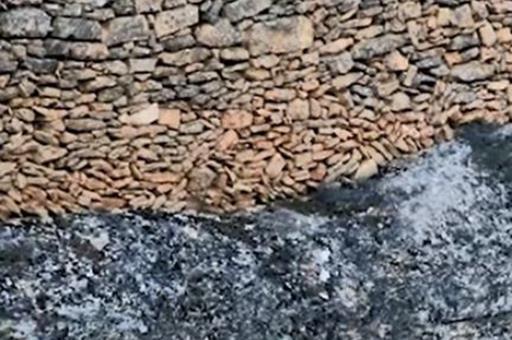Candidature put forward by Spain, Greece, Cyprus, France, Croatia, Slovenia, Italy and Switzerland
"Art of dry-stone walling" declared as Intangible Cultural Heritage by UNESCO
News - 2018.11.28
"The art of dry-stone walling"
Spain, Greece, Cyprus, France, Croatia, Slovenia, Italy and Switzerland participated presenting this candidature. Examples of this technique can be found throughout Spain, especially in the autonomous regions of Andalusia, Aragon, Asturias, the Balearic Islands, Catalonia, Extremadura, Galicia and Valencia, which presented this bid.
"The art of dry-stone walling" refers to the knowledge related to the construction of stone structures by piling them on top of one another without using any other material to hold them together. Dry-stone structures are mainly found in rural areas, on steep land, both in and outside of inhabited areas. Structural stability is ensured by the careful selection and placement of the stones.
Dry-stone structures have given shape to numerous and varied landscapes, creating various forms of homes, agriculture and livestock farming, and bear witness to the methods and practices used by people throughout time from pre-history to modern day to organise the spaces where they live and work by making optimal use of local natural and human resources. They play a vital role in the prevention of landslides, floods and avalanches, and in the fight against erosion and desertification, improving biodiversity and creating microclimatic conditions suitable for agriculture.
Spain, leader in heritage diversity
With this latest declaration, Spain has consolidated its position among the leading group of countries with the most expressions of this nature, and especially as a country with the greatest heritage diversity. The latest declaration means Spain is the country with the fourth-highest number of expressions included on the Representative List of Intangible Cultural Heritage, with a total of 17 registered expressions. In terms of World Heritage Sites, Spain is third on the UNESCO list with 47 declared sites. Spain is the only country of the top-three to have declarations in all UNESCO categories: world heritage cities, contemporary architecture, monuments, landscapes or sites...
The "Tamboradas drum-playing rituals" bid
On 29 November, the committee will evaluate the Spanish expression of culture known as "Tamboradas drum-playing rituals", a candidate for addition to the same UNESCO list.
The "tamboradas drum-playing rituals" bid includes places occupying a large part of Spain's geography from north to south and sharing a common language through the organisation of group drumming rituals. The cities included in this bid are located in five different autonomous regions:
- Andalusia: Baena (Cordoba)
- Aragon: Albalate del Arzobispo, Alcañiz, Alcorisa, Andorra, Calanda, Híjar, La Puebla de Híjar, Samper de Calanda and Urrea de Gaén (Teruel)
- Castile-La Mancha: Agramón, Hellín and Tobarra (Albacete)
- Region of Valencia: Alzira (Valencia) and Alcora (Castellon),
- Region of Murcia: Moratlla and Mula
The various communities and groups organise themselves under the Consorcio Nacional de los Pueblos del Tambor y el Bombo de España [National Consortium of Drumming Towns of Spain], which organises the national day of the drum every year. This event is celebrated in various places throughout Spain.
Non official translation





